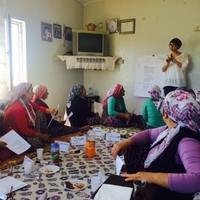
Martin Kramer
Martin Kramer is a historian at Tel Aviv University and the Walter P. Stern fellow at The Washington Institute for Near East Policy. He is an authority on the history and politics of the Middle East and modern Israel.
Kramer was the founding president of Shalem College in Jerusalem, Israel’s first liberal arts college, and also first chair of its program in Middle East and Islamic studies.
Kramer earned his undergraduate and doctoral degrees in Near Eastern Studies from Princeton, where he prepared his thesis under the supervision of Bernard Lewis. He has been a visiting professor or fellow at Brandeis, Chicago, Cornell, Georgetown, Harvard, Johns Hopkins and the Wilson Center.
His authored and edited books include Islam Assembled; Shi'ism, Resistance and Revolution; Middle Eastern Lives; Arab Awakening and Islamic Revival; The Islamism Debate; The Jewish Discovery of Islam; Ivory Towers on Sand; and The War on Error.
Kramer lives in Raanana, Israel. He and his wife have three children and four grandchildren.
Supervisors: Bernard Lewis
Kramer was the founding president of Shalem College in Jerusalem, Israel’s first liberal arts college, and also first chair of its program in Middle East and Islamic studies.
Kramer earned his undergraduate and doctoral degrees in Near Eastern Studies from Princeton, where he prepared his thesis under the supervision of Bernard Lewis. He has been a visiting professor or fellow at Brandeis, Chicago, Cornell, Georgetown, Harvard, Johns Hopkins and the Wilson Center.
His authored and edited books include Islam Assembled; Shi'ism, Resistance and Revolution; Middle Eastern Lives; Arab Awakening and Islamic Revival; The Islamism Debate; The Jewish Discovery of Islam; Ivory Towers on Sand; and The War on Error.
Kramer lives in Raanana, Israel. He and his wife have three children and four grandchildren.
Supervisors: Bernard Lewis
less
Related Authors
Ronald Ranta
Kingston University, London
Gilang A G Lukman
University of Oxford
Ziv Rubinovitz
University of Haifa
Rebecca Stein
Duke University
Zeynep Baser
Sabanci University
Rachel Havrelock
University of Illinois at Chicago
InterestsView All (15)








Uploads
Books by Martin Kramer
Papers by Martin Kramer
But another vote took place at that same session. It was a close one—five to four—and it had far-reaching consequences for the future of Israel. Although Ben-Gurion chalked it up as a triumph, it’s usually overlooked. I offer a full account in my essay, “The May 1948 Vote That Made the State of Israel,” at Mosaic Magazine.
In this Policy Focus, Dr. Martin Kramer surveys the state of government-academe relations ten years after his bestselling book Ivory Towers dissected "the failure of Middle Eastern studies in America." Intended as a short field manual for government engagement with professors, deans, and university presidents, the paper describes how policymakers can better wield three of academia's most important levers: the clout inherent in peer review, the influence conferred by academic endowments, and the access created by sharing information despite the need to keep some of it classified.
But another vote took place at that same session. It was a close one—five to four—and it had far-reaching consequences for the future of Israel. Although Ben-Gurion chalked it up as a triumph, it’s usually overlooked. I offer a full account in my essay, “The May 1948 Vote That Made the State of Israel,” at Mosaic Magazine.
In this Policy Focus, Dr. Martin Kramer surveys the state of government-academe relations ten years after his bestselling book Ivory Towers dissected "the failure of Middle Eastern studies in America." Intended as a short field manual for government engagement with professors, deans, and university presidents, the paper describes how policymakers can better wield three of academia's most important levers: the clout inherent in peer review, the influence conferred by academic endowments, and the access created by sharing information despite the need to keep some of it classified.